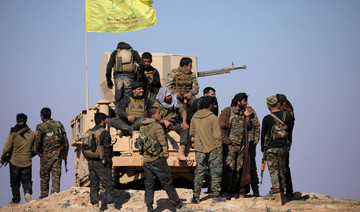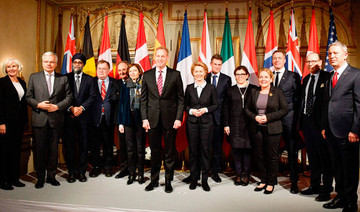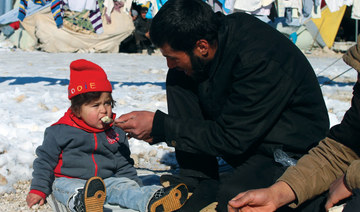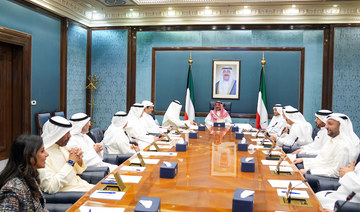BAGHOUZ, Syria: A US-backed force in Syria is closing in on Daesh militants in a tiny area less than a square kilometer (square mile) in eastern Syria, and will soon declare the defeat of the militant group, a commander with the group said Saturday.
The capture of the last pocket still held by Daesh fighters in the village of Baghouz would mark the end of a devastating four-year global campaign to end the extremist group’s hold on territory in Syria and Iraq — their so-called “caliphate” that at the height of the group’s power in 2014 controlled nearly a third of both Iraq and Syria.
“We will very soon bring good news to the whole world,” said Ciya Furat, a commander with the Kurdish-led force known as the Syrian Democratic Forces, speaking at a news conference at the Al-Omar Oil Field Base in the Deir Ezzor province.
President Donald Trump said the White House will make an announcement about Syria and the fight against Daesh by the end of Saturday.
“We have a lot of great announcements having to do with Syria and our success with the eradication of the caliphate and that will be announced over the next 24 hours,” Trump told journalists at the White House on Friday.
An Associated Press team in Baghouz Saturday, hundreds of meters away from the last speck of land where Daesh militants were holed up, saw several aircraft overhead and two airstrikes hit the area. SDF fighters said were fired by the US-led coalition.
The Syrian Democratic Forces declared the final push to capture the village a week ago after more than 20,000 civilians, many of them the wives and families of foreign fighters, were evacuated.
Since then, SDF commanders say they have been surprised to discover that there were hundreds more civilians in the enclave, after they were brought up by the militants from underground tunnels. Their presence has slowed down the SDF advance.
Furat, the SDF commander, said Daesh fighters are now besieged in an area that is about 700 square meters (840 square yards). He said that SDF fighters were able to liberate 10 of their colleagues that were held by Daesh.
Furat’s comments were carried by Kurdish news agencies, including Hawar News.
“We are dealing with this small pocket with patience and caution. It is militarily fallen but civilians are used as human shields,” SDF spokesman Mustafa Bali told The Associated Press. Bali added that the SDF believes that Daesh gunmen are also holding previously kidnapped Syrians in the area.
Rami Abdurrahman, who heads the Britain-based Syrian Observatory for Human Rights, a war monitor, said SDF fighters are almost in full control of the area once controlled by extremists, adding that there might still be Daesh fighters hiding in a network of underground tunnels.
The Observatory said that some 200 Daesh gunmen surrendered Friday, days after about 240 others surrendered and were taken by SDF fighters and members of the US-led coalition.
“The defeat of Daesh will come within days,” Furat said. He added that after the physical defeat of Daesh, the SDF “will continue in its fight against Daesh sleepers cells.”
Despite the expected defeat on the ground, activists and residents say Daesh still has sleeper cells in Syria and Iraq and is laying the groundwork for an insurgency. The group has claimed responsibility in recent months for deadly attacks, mostly in Iraq, more than a year after the Iraqi government said the extremists have been defeated after losing the northern city of Mosul in 2017, the largest they held.
US-backed fighters closing in on Daesh gunmen in eastern Syria
US-backed fighters closing in on Daesh gunmen in eastern Syria
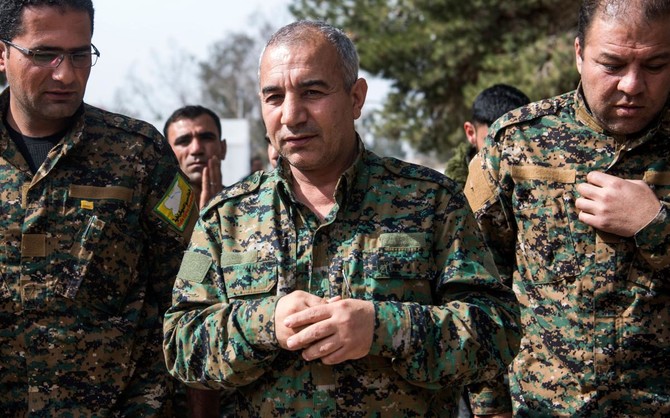
- President Donald Trump said the White House will make an announcement about Syria on Saturday
- Groups said that some 200 Daesh gunmen surrendered Friday
Mikati, Macron discuss Lebanon crisis as Army chief presents military needs in Paris talks
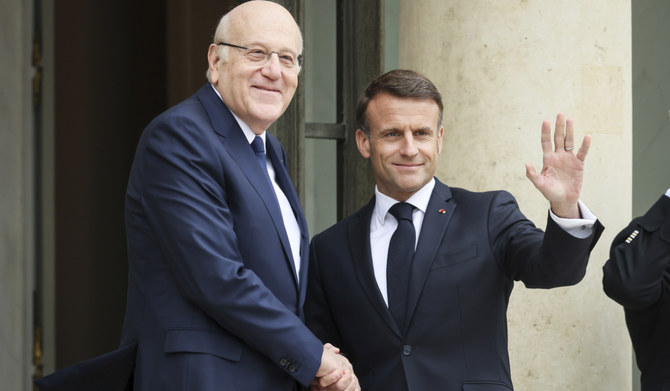
- Israeli raid kills official working for educational body affiliated with Hezbollah
BEIRUT: Israel continued its raids on Hezbollah positions on Friday amid reports of dawn explosions in Iran, as Lebanon’s caretaker Prime Minister Najib Mikati held talks with French President Emmanuel Macron at the Elysee Palace.
Lebanese Army Commander Gen. Joseph Aoun and the Chief of Staff of the French Armed Forces Gen. Thierry Burkhard also attended the extended meeting.
According to reports, Aoun presented a study to the French military commander, as well as the head of the Italian armed forces, about the needs of the Lebanese Army, its current situation, challenges, and logistical and material requirements.
The discussion focused on “how to assist in enhancing the situation of the Lebanese army in the south, provided that a committee is formed to study these needs and how to secure the necessary support and funding.”
The international community insists on Lebanon’s compliance with UN Security Council Resolution 1701, while Lebanon, in return, demands assistance for its military to enable it to deploy more of its forces in the south to implement the resolution.
Aoun described his separate meetings with his French and Italian counterparts as “positive.”
Israeli warplanes carried out an attack on a house in the town of Aita Al-Shaab with two air-to-ground missiles.
The raid resulted in the killing of Mohammed Hassan Abdel Mohsen Fadlallah, 54, who worked at the Islamic Education Foundation (Al-Mahdi Schools), an educational institution affiliated with Hezbollah.
Israeli Army spokesman Avichay Adraee said on X that “reconnaissance soldiers from Battalion 869 spotted saboteurs inside a military building belonging to the Hezbollah terrorist organization in the Aita Al-Shaab area. An airstrike targeted the building and the saboteurs who were stationed there.”
Hezbollah announced a few hours later the targeting of a gathering of Israeli soldiers in the vicinity of the Al-Raheb site with artillery shells.
Israeli forces fired machine guns at one of the Wazzani areas while Israeli artillery shelled the outskirts of the town of Rmeish.
The total number of Hezbollah deaths has now reached 280 since the beginning of the war.
Russia Today news agency — citing Israel’s Yneti website — claimed it had the names of a number of high-ranking Hezbollah members who were killed in Israeli airstrikes in Lebanon since the start of the clashes on the southern front on Oct. 8.
The report stated that the Israeli Army often carries out attacks against vehicles, “demonstrating its deep knowledge of Hezbollah's organizational structure and role distribution in the field.”
According to the report, 14 senior Hezbollah figures have been killed in the attacks.
They include Ismail Youssef Baz, the commander of the coastal sector of Hezbollah; Mohammed Hussein Mustafa Shahhouri, the commander of the rocket and missile unit in the western sector of the Radwan Force; Ali Ahmed Hussein, the commander of the Hajir region of the Radwan Force; Ali Abdul Hassan Naeem, deputy commander of the rocket and missile unit in Hezbollah; and Ali Mohammed Al-Debs, a central commander in the Radwan Force.
The report also published the following names: Hassan Mahmoud Saleh, commander of the attack in the Jabal Douf area; Mohammed Alawiyah, commander of Hezbollah’s Maroun Al-Ras area; Hassan Hussein Salama, a commander in Hezbollah’s Nasser unit; Wissam Al-Taweel, a commander in the Radwan Force; Ali Hussein Burji, commander of the southern Lebanon region of Hezbollah’s air unit; Hussein Yazbek, local commander of Hezbollah in Naqoura; Abbas Mohammed Raad, a leader in the Radwan Force and son of the head of the Hezbollah parliamentary bloc; Khalil Jawad Shehimi, a leader in the Radwan Force; and Ali Mohammed Hadraj, commander the Palestine branch of the Quds Force in the Tyre area.
Hezbollah usually mourns its dead without acknowledging their political or military roles within the organization.
Kuwait economic fund signs coordination MoU with ILO
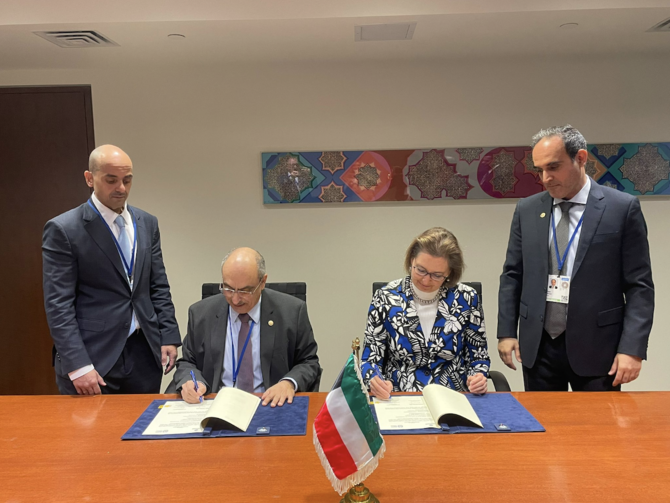
- MoU aims to coordinate joint actions in economic and social development in developing countries
WASHINGTON: The Kuwait Fund for Arab Economic Development has agreed a memorandum of understanding with the International Labor Organization to enhance development cooperation, Kuwait News Agency reported.
The MoU was signed by KFAED Acting Director General Waleed AI-Bahar and ILO Assistant Director General for External and Corporate Relations Laura Thompson on the sidelines of the 2024 spring meetings of the International Monetary Fund and World Bank in Washington DC.
The MoU establishes a framework for technical cooperation and aims to coordinate joint actions in economic and social development in developing countries. This includes exchanging expertise and information in economic, financial and commercial sectors.
The five-year renewable agreement focuses on collaborative activities aligned with the goals of both organizations in the countries in which they operate. The partnership will also involve sharing resources in areas of mutual interest such as statistics, policy enhancement, youth economic empowerment, gender equality at work, crisis response and South-South cooperation.
Regular consultations are planned to ensure effective coordination of operations in the targeted nations.
International reactions after Israel’s reported attack on Iran
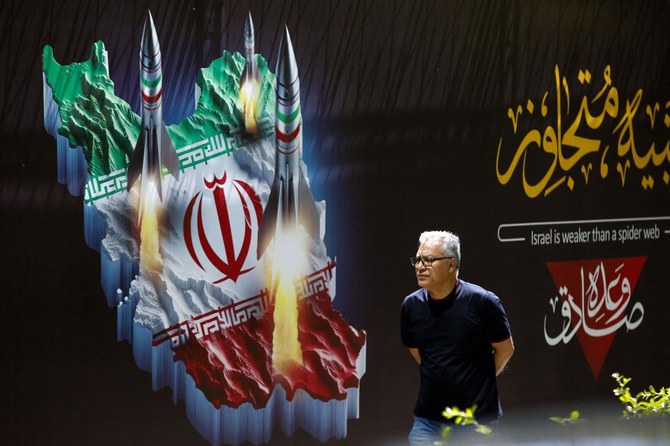
- Widespread calls for utmost restraint between Iran and Israel to avoid serious repercussions
PARIS: Here are some international reactions Friday after Israel’s reported attack on the Iranian province of Isfahan, where it has military bases and nuclear facilities:
UN SECRETARY-GENERAL ANTONIO GUTERRES
UN Secretary-General Antonio Guterres reiterated that it was “high time to stop the dangerous cycle of retaliation in the Middle East,” his spokesperson said in a statement.
“The Secretary-General condemns any act of retaliation and appeals to the international community to work together to prevent any further development that could lead to devastating consequences for the entire region and beyond,” Stephane Dujarric said.
RUSSIA
Russia has made clear to Israel that Iran “does not want escalation,” Moscow’s foreign minister Sergei Lavrov said Friday, after reports Israel had carried out retaliatory strikes against its arch-rival.
“There have been telephone contacts between the leadership of Russia and Iran, our representatives and the Israelis. We made it very clear in these conversations, we told the Israelis that Iran does not want escalation,” Lavrov said in an interview with Russian radio stations.
UAE
The United Arab Emirates’ foreign ministry on Friday expressed concern about regional tensions in a statement, calling for ‘utmost restraint’ to avoid serious repercussions.
JORDAN
Jordan’s Foreign Minister Ayman Safadi said on Friday Israeli-Iranian retaliations must end, warning against danger of regional escalation.
GERMANY
German Chancellor Olaf Scholz called for de-escalation following a strike on the Iranian city of Isfahan and said Berlin would work with its partners in this direction.
“De-escalation remains the order of the day in the near future. And we will also talk about this with all our friends and allies, and work together with them in this direction,” Scholz told reporters on Friday.
G7
G7 foreign ministers Friday urged “all parties” to “work to prevent further escalation” in the Middle East, following reports that Israel had carried out revenge strikes on Iran.
“In light of reports of strikes on April 19th, we urge all parties to work to prevent further escalation. The G7 will continue to work to this end,” the Group of Seven industrialized nations said in a statement.
The ministers from Italy, the UK, US, France, Germany, Japan and Canada said they “demand that Iran and its affiliated groups cease their attacks”.
SPAIN
Spanish Prime Minister Pedro Sanchez called Friday for all sides to avoid “an escalation of the conflict in the Middle East” after reports that Israel carried out retaliatory strikes on Iran.
“We must avoid any action that would lead to an escalation of the conflict in the Middle East. The seriousness of the moment demands responsibility and restraint from all parties,” he wrote on X.
JAPAN’S CHIEF CABINET SECRETARY YOSHIMASA HAYASHI
“Japan is deeply concerned about the situation in the Middle East and strongly condemn any actions that lead to the escalation of the situation.
“Japan will continue to make all necessary diplomatic efforts to prevent the situation from worsening further.”
CHINA
“China opposes any actions that further escalate tensions and will continue to play a constructive role to de-escalate the situation,” said foreign ministry spokesman Lin Jian.
IAEA
“IAEA can confirm that there is no damage to Iran’s nuclear sites. Director General Rafael Grossi continues to call for extreme restraint from everybody and reiterates that nuclear facilities should never be a target in military conflicts. IAEA is monitoring the situation very closely,” the International Atomic Energy Agency said on X.
OMAN
“The Sultanate of Oman is following the continuing tension in the region and condemns the Israeli attack this morning on Isfahan,” the foreign ministry said, adding that it also “condemns and denounces Israel’s repeated military attacks in the region.
“Oman once again appeals to the international community to address the causes and roots of tension and conflict through dialogue, diplomacy and political solutions, and to focus on ceasefire efforts in Gaza and resort to international law and United Nations resolutions to reach a just and lasting solution to the Palestinian issue.”
EC PRESIDENT URSULA VON DER LEYEN
“We have to do everything possible (so) that all sides restrain from the escalation in that region ... It is absolutely necessary that the region stays stable and that all sides refrain from further action,” European Commission president Ursula von der Leyen.
UK
“We have condemned Iran’s reckless and dangerous barrage of missiles against Israel on Saturday and Israel absolutely has a right to self-defense. But as I said to Prime Minister Netanyahu when I spoke to him (this week) and more generally, significant escalation is not in anyone’s interest, what we want to see is calm heads prevail across the region,” Prime Minister Rishi Sunak said.
ITALY
“We invite everyone to be cautious to avoid an escalation,” Foreign Minister Antonio Tajani told RAI news on Capri where Italy is hosting a meeting of foreign ministers from the Group of Seven nations.
“This is something we from the government’s side take very seriously and are following very closely,” Foreign Minister Tobias Billstrom said.
“There has to be an end to the exchange of blows and escalation.”
Gazans cool down in seawater despite nearby Israeli vessels

- Soaring temperatures in the embattled Palestinian enclave have prompted Gazan children to resort to the sea
RAFAH: Soaring temperatures in Gaza during the past week have driven thousands in the enclave’s southern city of Rafah to seek respite on beaches.
The proximity to Israeli military vessels did not stop hundreds of war-weary Gazans from bringing their children to enjoy a day of paddling and swimming, according to Arab News’ reporter in the embattled Palestinian enclave.
Many of the 1.4 million displaced Palestinians in Rafah live in makeshift shelters, including tents, on the beach, near the Egyptian border.
Since the Israeli onslaught on the Gaza Strip broke out on Oct. 7 last year, Gazans have been forced to resort to salty seawater for washing, bathing and even drinking due to the collapse of the water system.
Dubai carrier Emirates suspends check-in for onward connections, flydubai cancels Iran flights

- Dubai International Airport temporarily limiting the number of arriving flights for 48 hours from 12 p.m. on Friday
DUBAI: Dubai’s flagship airline Emirates is suspending check-in for all customers with onward connections through the city until 2359 GMT on Friday, three days after a record storm swept the United Arab Emirates.
Emirates, one of the world’s biggest international airlines, said customers traveling to Dubai as their final destination may check-in and travel as usual.
The suspension shows the airline and its hub, Dubai International Airport, are still struggling to clear a backlog of flights after the UAE saw its heaviest rains in the 75 years records have been kept, bringing much of the country to a standstill for two days and causing significant damage.
Dubai International airport, one of the world’s busiest, later said it was temporarily limiting the number of arriving flights for 48 hours from 12 p.m. on Friday to speed up recovery operations from rain and flooding.
Thousands of passengers have been affected by flight cancelations this week, Dubai Airports Chief Executive Paul Griffiths told local radio station Dubai Eye on Friday, after the storm flooded taxiways.
The storm, which hit neighboring Oman on Sunday, pounded the UAE on Tuesday, with 20 reported dead in Oman and one in the UAE.
Dubai’s budget carrier flydubai meanwhile canceled flights to Iran on Friday after receiving an official alert, a statement said.
“In line with the issued NOTAM (notice to air missions), our flights to Iran today have been canceled,” said the statement.
One flight which had already departed for Tehran returned to Dubai after the Iranian capital’s airport was closed, it added.
Flights were suspended across swathes of Iran as Iranian state media reported explosions in the central province of Isfahan.
Flight-tracking software showed commercial flights avoiding western Iran, including Isfahan, and skirting Tehran to the north and east.
The main road that connects the UAE’s most populous emirate Dubai with Abu Dhabi remains partially closed, while an alternative route into Dubai requires vehicles to use a road that is entirely covered in floodwater where cars and buses have been abandoned.
In the UAE’s north, including in the emirate of Sharjah, people were reportedly still trapped in their homes, while others there said there had been extensive damage to businesses.
Rains are rare in the UAE and elsewhere on the Arabian Peninsula, which is typically known for its dry desert climate where summer air temperatures can soar above 50 degrees Celsius.
The UAE’s National Center of Meteorology said on social platform X that Monday may see light rainfall by late night and forecast “a chance of light to moderate rainfall, might be heavy at times over some areas” for Tuesday, with a fall in temperatures over some coastal areas.


